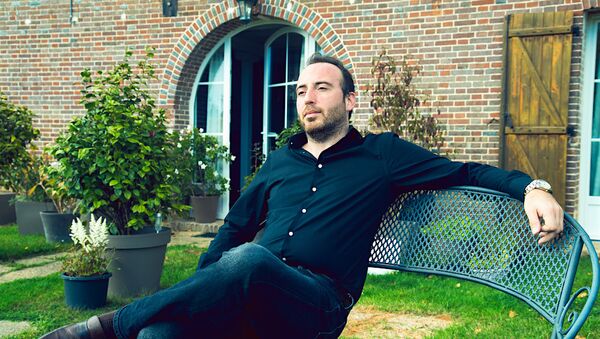Jean-Pierre Duthion spent seven years in Syria, from 2007 to 2014, helping French and international companies gain access to the Syrian market. When the war started in 2011, he decided to stay in the country and even opened a bar in Damascus. After realizing the disparity between what was really happening in Syria and what was being reported by the Western media, he started posting images of Damascus on his Twitter account. Soon many French nationals and European media crews started asking him to accompany them in Damascus (in particular during the chemical attack on Ghouta).
In 2014 Duthion was suddenly arrested. He believes it was because he refused to give a bribe to a high-ranking official. A few days later he was released, and with the help of the Romanian Embassy and the French Consulate in Beirut, he left the country and ended up in Lebanon. After returning to France, he has worked as a consultant for various media outlets. He has shared his memories with Sputnik France. spoken
About the Disparity Between What Was Really Happening During the Protests in Syria and What Was Reported by Western Media:
"When you hear the distant sounds of shooting, explosions, when you see clouds of smoke rising in the distance and at the same time channels such as France24, BBC, CNN are reporting that across the country mass protests are being suppressed and that hundreds or thousands of people have been killed, you ask yourself what sources of information these media outlets are relying on. Naturally they are people that are not always objective, because at that time journalists, with certain exceptions, didn't have the right to be in Syria.
READ MORE: How Mosul, Aleppo Become MSM's "Double Standards for Dummies" Manual
Who are those people? They are witnesses that France24 would call "citizen journalists" which, equipped with a phone, sitting in their bedroom, and sometimes through Skype, would talk about what's happening. There's no way to check that information so you can forget about journalist ethics, which requires three sources, not known to each other to verify information. Any individual using Twitter or publishing posts on Facebook becomes a legitimate source of information, which means there's no way to question their words. Given that […] everything needs to fit the notion of the collapse of the Syrian regime then everything we hear in the media starts making sense."
About the Media That Encouraged People to Come to the Streets:
"I'm mad at the media, because they prompted people to come out to the streets to protest. That's why from the start I didn't believe in the success of this movement, not because I don't think it has the right to exist, […] but because I was certain that a regime change would never happen in Syria."
How I became a Journalist:
The day I became a journalist by chance, France24 channel and other news outlets were reporting that at the Abbaseyin square the army was suppressing hundreds of protesters and that the revolution was about to start. Back then, I was engaged to a woman that lived three minutes away from that square, so I got in my car and headed there. There was not a soul there, too quiet for a place where there must be bloodshed. My car was one of the few cars at the square. I decided to stop and take a few photos, which I published on Twitter. […] My phone rang nonstop. The rest of the day I spent on the phone talking to journalists from CNN, BCC and French news which saw my photos on Twitter."
On Meeting French Jihadists:
"In Homs and Aleppo I met with French jihadists arrested by government forces and had the opportunity to talk to them. […] What surprised me was that they had no ideology, […] these were boys, and they were sort of outcasts. […] Most were under 24 years of age."
About the Chemical Attack on Ghouta:
"The chemical attack on Ghouta seems absolutely irrational to me because I spoke to the Syrian army officers. […] UN observers were just a few kilometers away from Ghouta at the outskirts of Damascus. […] It's hard to imagine that the Syrian government would use chemical weapons in Ghouta when just a few kilometers away there are UN observers that were in Syria to make sure there were no chemical weapons in the country. It doesn't make any sense, neither the timing nor the place. […] Also the fact that the army I saw in Syria had poor weaponry and many didn't even have bulletproof vests shouldn't be overlooked."
READ MORE: Damascus Orphans Send Touching Plea for Peace to Militants in Eastern Ghouta
Arrest and Freedom:
"I was arrested. When I asked the head of prison for what, he didn't explain much. France didn't undertake any measures apart from the French Consul acting on her own initiative with no backing from the French authorities […] she decided to contact the Romanians, which I had a really good relationship with, and asked them to help, granting me a diplomatic pass. The Romanian embassy was one of the few European missions still operating in Syria. […] Syrians had to let me go. […] They took me out of the city and I spent 45 minutes in a pickup truck under blazing sun and flying sniper bullets."
On Contacts With French Intelligence Services:
"French Intelligence Services often show incompetence […] I remember being questioned about how things are going for people who I knew for a fact had died several months ago at that time. At first you tell yourself you're being tested, just as I could have been tested by other security services — by the Americans, the English, the Romanians, but then very quickly you realize that this is no test."
The views and opinions expressed in the article are those of Jean-Pierre Duthion and do not necessarily reflect those of Sputnik.



